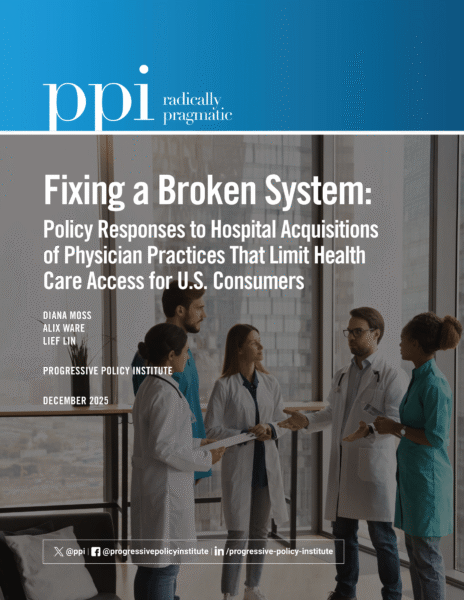WASHINGTON — The Progressive Policy Institute (PPI) today released a landmark report detailing how a wave of hospital acquisitions of independent physician practices is restricting consumer access to health care, driving up prices and costs, and accelerating the erosion of physician autonomy. The study, “Fixing a Broken System: Policy Responses to Hospital Acquisitions of Physician Practices That Limit Health Care Access for U.S. Consumers,” analyzes national data from 2017 to 2024 and reviews more than 70 economic studies to unveil the mounting consequences of unchecked vertical consolidation.
Led by Diana Moss, Vice President and Director of Competition Policy, with coauthors Alix Ware, Director of Health Care Policy, and Lief Lin, Policy Research Fellow, the report shows that the share of independent physician practices has fallen sharply across the country as hospitals and large health systems absorb local providers. In many specialties, independent practices declined by up to 40%, with the steepest losses occurring in general surgery, oncology, and cardiology. Rural communities were hit hardest, experiencing a 34% decline in independent practices, compared to 22% in urban areas.
“The collapse of independent physician practices is not an isolated trend. It is a major structural shift that threatens affordability, choice, and the long-term resilience of our health care system,” said lead author Diana Moss. “Hospitals are acquiring local practices at a lightning pace, and consumers are paying the price through higher bills and fewer options.”
Key findings from the report include:
- Most economic studies show hospital acquisitions of physician practices lead to higher prices and increased spending, with average price hikes of 14% and some exceeding 30%.
- Nearly half of post-acquisition price increases stem from hospitals exploiting Medicare’s site-of-service payment differentials.
- Large health systems are driving consolidation, with some expanding their ownership of physician practices by several hundred percent between 2017 and 2024.
- Current antitrust enforcement is far below average for the hospital and ambulatory health services sectors, despite mounting evidence of harm.
PPI’s analysis also underscores how state-level policies such as certificate of need (CON) laws and certificate of public advantage (COPA) agreements often exacerbate consolidation by raising barriers to entry and shielding hospital mergers from antitrust scrutiny. States without CON laws show significantly higher survival rates for independent physician practices and more new entry.
To address the crisis, PPI calls for a five-part federal and state policy strategy:
- Enact site-neutral Medicare payment reform to eliminate the financial incentives driving hospital purchases of physician practices.
- Strengthen antitrust enforcement to scrutinize hospital acquisitions of physician practices and challenge harmful transactions.
- Consider reforms to state CON and COPA laws that restrict competition and reinforce hospital market power.
- Protect physician autonomy by modernizing governance, compensation rules, and related federal policies that limit physician-led models.
- Strengthen rural health care access through targeted reinvestment, value-based care, and innovative delivery models.
“This is a moment for urgent, bipartisan action,” said co-author Alix Ware. “If policymakers fail to reform the incentives that fuel consolidation, patients will face even higher costs and fewer choices. The time to intervene is now.”
Read and download the report here.
Founded in 1989, PPI is a catalyst for policy innovation and political reform based in Washington, D.C. Its mission is to create radically pragmatic ideas for moving America beyond ideological and partisan deadlock. Find an expert and learn more about PPI by visiting progressivepolicy.org. Follow us @PPI.
###
Media Contact: Ian O’Keefe – iokeefe@ppionline.org




